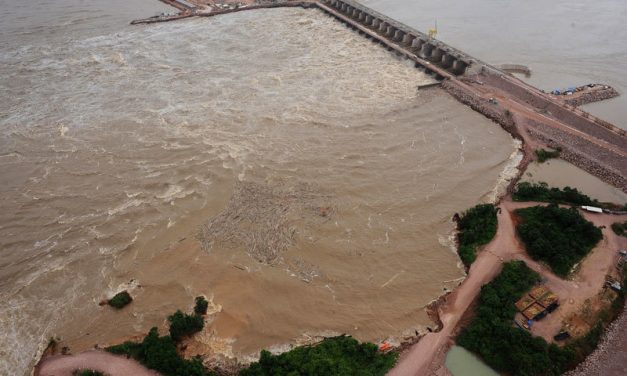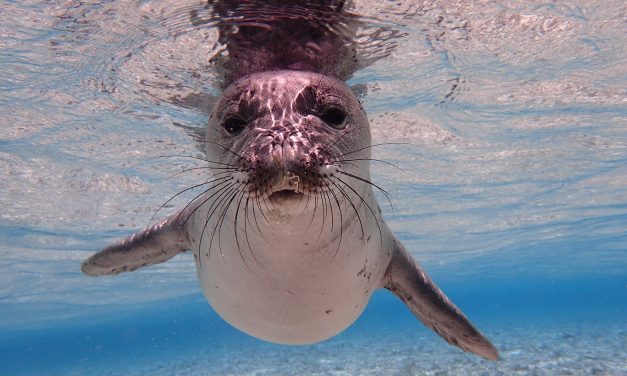Wilderness restoration
More Than 500 Dams Planned in Protected Areas Around the Globe, Study Finds
by The CNCL Team | Aug 5, 2020 | Earthlings | 0
More than 500 dams are planned or already under construction within protected areas around the world, according to a new study published in the journal Conservation Letters.
Read MoreThe Top 10 Ocean Biodiversity Hotspots to Protect
by The CNCL Team | Jun 7, 2020 | Earthlings | 0
A new study took a deep dive into critical aspects of ocean life to identify the areas of the high seas most worthy of conservation effort.
Read MoreRoom to Roam: How Animals Benefit From Wildlife Corridors
by The CNCL Team | Sep 12, 2019 | Earthlings | 0
Development, resource extraction and roadbuilding have fragmented landscapes and reduced wild spaces making it harder for animals to find food, search for a mate and adapt to a changing climate. Ecologists and conservationists have been working for decades to create wildlife corridors — areas of natural habitat that can reconnect fragmented habitats.
Read More11 Years, 40,000 Trees & a ‘Crazy’ Hero: Meet Chitrakoot’s Tree Man
by The CNCL Team | Aug 29, 2019 | Personal | 0
How did a single person’s efforts lead to a forest spanning five acres in Bundelkhand, a region notorious for its arid geography, sparse rainfall, and decade-long droughts?
Read MoreIn Ecuador, One Man’s Mission to Restore a Piece of the Rainforest
by The CNCL Team | Aug 15, 2019 | Earth | 0
Ecuador has lost thousands of square miles of rainforest, the land converted to pasture and crop fields and cleared for oil and gas development. Today, trees cover just 35 percent of the country’s surface, down from more than 90 percent a century ago.
Read MorePlanting Trees Is Good. Eliminating Deforestation is Better.
by The CNCL Team | Aug 12, 2019 | Earth | 0
Planting more trees is one way to offset deforestation. But now, a report from the United Nations’ Intergovernmental Panel on Climate Change finds that to have a shot at combatting the climate crisis, among other efforts, we’ll need to cut down fewer trees to begin with.
Read MoreWe Can’t Keep Eating as We Are – Why Isn’t the IPCC Shouting This from the Rooftops?
by The CNCL Team | Aug 12, 2019 | Earth | 0
The new report on land by the Intergovernmental Panel on Climate Change (IPCC) shies away from the big issues and fails to properly represent the science. As a result, it gives us few clues about how we might survive the century.
Read MoreAnimal Agriculture Is Major Threat to Koalas
by The CNCL Team | Aug 8, 2019 | Earth, Earthlings | 0
Koalas in Australia are at risk of becoming extinct. The key threat to koala survival is land clearing, both past and continuing, and the key driver for tree-clearing is the production of animal products.
Read MoreJane Goodall on Climate Change: ‘Something’s Got to Give’
by The CNCL Team | Aug 8, 2019 | Earth | 0
At the age of 26, Dr Jane Goodall pioneered new ways of researching animals including by living with them. Now, aged 85 and a UN Messenger of Peace, she travels more than 300 days a year to share the urgency of taking action on climate change on behalf of all living things and the planet we share.
Read MoreEthiopia Plants 350 Million Trees in One Day to Fight Climate Change
by The CNCL Team | Aug 8, 2019 | Earth | 0
Ethiopia just broke a world record during its fight against the climate crisis. In a single day, the country planted more than 350 million trees. Previously, India held the record for the most trees planted in one day, planting 50 million trees within 24 hours in 2016.
Read MoreThe Rights of Nature with Mari Margil and Thomas Linzey
by The CNCL Team | Jul 10, 2019 | Earth | 0
Communities are now passing legislation to recognize the legally binding rights of nature. This spreading network is honoring and upholding the personhood of the environment, instead of the personhood of the corporations destroying it. Featuring Mari Margil, Associate Director of the Community Environmental Legal Defense Fund, and Thomas Linzey, co-founder of the Community Environmental Legal Defense Fund.
Read MoreGlobal Effort to Plant a Trillion Trees ‘Overwhelmingly’ Among Most Effective—and Cheapest—Solutions to Climate Emergency: Study
by The CNCL Team | Jul 8, 2019 | Earth, Human Society | 0
Amid record-setting temperatures worldwide and predictions by experts that this year will be among the hottest humanity has ever seen, researchers behind a new study say a rapid global effort to plant billions of trees and the restoration of forests would be the “most effective” strategy for battling the planetary climate emergency.
Read MoreBritain Becomes First Major Country to Commit to Legally Binding Zero Emissions Target
by The CNCL Team | Jun 12, 2019 | Earth, Human Society | 0
Theresa May will make the UK the first economy in the G7 to legislate for zero emissions. The CCC report also confirmed that even if other countries followed the UK by setting a zero emissions target, there was still just a 50/50 chance that the planet would remain below the recommended temperature of 1.5 degrees Celsius by 2100. Anything above that guarantees a shift in climate that will threaten human life.
Read MoreIn the Fight Against Climate Change, Humans and Wildlife Are Allies
by The CNCL Team | Jun 11, 2019 | Earth, Earthlings | 0
Climate change is accelerating at a breakneck pace, already affecting about half of all threatened mammal species and a quarter of threatened birds. And according to a study published in Science last year, if nothing is done to curb our carbon emissions, nearly 50 percent of the planet’s insects, which make up the foundation of food webs all over the globe, could disappear by the end of the century.
Read MoreChernobyl Has Become an ‘Accidental Wildlife Sanctuary’ Thriving with Life
by The CNCL Team | May 28, 2019 | Earthlings, Human Society | 0
In the 30+ years since the disaster zone was evacuated, rare and endangered animals are flourishing. What may be a Zone of Alienation for humans has become an ironic haven for animals. And it begs the question: What if in the end, our dystopian nightmare becomes a dream come true for the rest of nature?
Read MoreCosta Rica Set To Become The Worlds First Plastic-Free And Carbon-Free Country By 2021
by The CNCL Team | May 10, 2019 | Earth, Human Society | 0
Costa Rica is in the top 5 of countries that are leading the way into renewable resources. It might seem small but it has a really big environmental impact. Since 2014 the country’s energy has been coming from 99% renewable sources, and it has been running on 100% renewable energy for over two months twice in the last two years.
Read MoreJust One-Third of the World’s Longest Rivers Remain Free-Flowing
by The CNCL Team | May 9, 2019 | Earth | 0
First-ever global assessment of the location and extent of the planet’s remaining free-flowing rivers highlights severe degradation
Read MoreAccelerating Renewable Revolution Can Achieve Global Climate and Energy Goals Without Damming World’s Remaining Free Flowing Rivers
by The CNCL Team | May 7, 2019 | Earth, Human Society | 0
With thousands of hydropower dams planned across the globe, a new report from WWF and The Nature Conservancy demonstrates how we can solve the world’s climate and energy challenge without sacrificing our remaining free-flowing rivers and the diverse benefits they provide to people and nature.
Read MoreCanada Just Banned Ocean Drilling and Mining to Protect Marine Life
by The CNCL Team | May 5, 2019 | Earthlings | 0
Canada has banned ocean drilling and mining in marine protected areas along the coast. According to Fisheries and Oceans Canada, the new marine protected areas will function like national parks of the sea. Drilling, mining, dumping, and bottom trawling — an industrial fishing method where a large net with heavy weights is dragged along the seabed — will all be prohibited.
Read MoreProducts That Destroy Rainforests Could Be Banned in California
by The CNCL Team | Apr 24, 2019 | Earth, Earthlings | 0
A new bill could aid rainforest preservation by banning services or products linked to rainforest deforestation. This would include beef, soy, palm oil, paper, and wood pulp amongst other products.
Read MoreSaving Ecosystems to Protect the Climate, and Vice Versa: a Global Deal for Nature
by The CNCL Team | Apr 22, 2019 | Earth, Earthlings | 0
A new study explores how to prevent a sixth great extinction and stop climate change at the same time. Forests, tundra and other ecosystems play critical roles.
Read MoreHave Hope, Humanity is Finding Ways to Defeat Climate Change
by The CNCL Team | Apr 18, 2019 | Earth, Human Society | 0
The restoration of these iconic areas in Ethiopia, while still ongoing, has been an astonishing achievement, and an enduring inspiration for the rest of the world to follow: an area associated with human tragedy a few decades ago is now home to viable rural communities drawing a sustainable living from the land, and seeking to remain there for the future.
Read MoreRestoring the Peruvian Amazon, One of the Most Ecologically Valuable Forests in the World
by The CNCL Team | Apr 15, 2019 | Earth, Human Society | 0
When the land is too degraded to support their crops, farmers often clear forests in search of new plots of nutrient-rich land. These scenarios are rapidly changing thanks to a groundbreaking project to transform agriculture in already-converted land in the southeastern region of Peru.
Read MoreThe Rights of Nature: Building a New People’s Movement for the Earth
by The CNCL Team | Apr 10, 2019 | Earth, Human Society | 0
Today, a new movement is building, which recognizes that we can no longer treat nature as limitless, or as simply existing for human use. This movement is transforming how the law treats nature — from being considered an item of property or commerce, to being recognized with legal rights of its own.
Read MoreDetermined to Save His Country’s Water Supply, 26-Year-old Has Revived 10 Lakes From a Polluted Mess
by The CNCL Team | Apr 7, 2019 | Earth, Human Society | 0
This 26-year-old engineer could not bear to see his country’s rivers and lakes plagued by drought and pollution – so he decided to do something about it.
Read MoreNature May Have the Answer to Plastic Pollution
by The CNCL Team | Apr 2, 2019 | Earth, Earthlings | 0
Scientists working on solutions to the growing problem of plastic pollution are now focusing attention on a potential breakthrough supplied by Mother Nature.
Read MoreDebunking Myths: 5 Things to Know About Green Infrastructure
by The CNCL Team | Mar 21, 2019 | Earth, Human Society | 0
Green infrastructure like healthy forests, wetlands and coral reefs can cheaply and effectively enhance the performance of traditional built, or “gray infrastructure.” Here, we dispel five myths holding green infrastructure back
Read More


